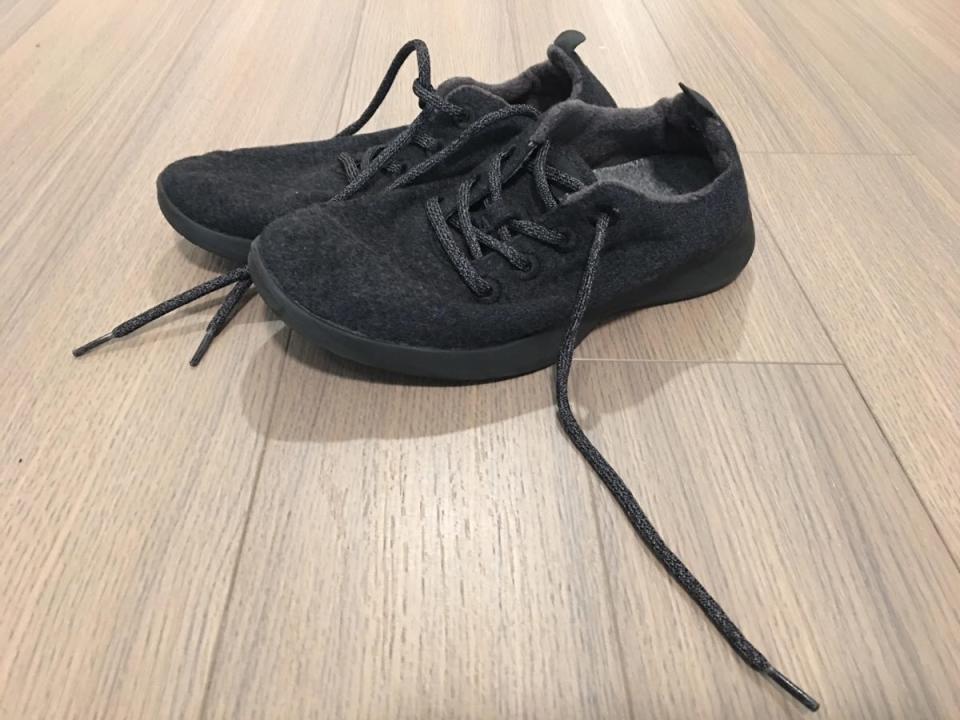Silicon Valley’s favorite sneaker has a wear-and-tear problem

Walk the streets, halls and open offices of Silicon Valley, and you’ll notice many tech workers wearing them: Allbirds’s Wool Runner sneakers. But the merino wool-made sneaker, which debuted to much fanfare in March 2016, has a problem: they simply don’t last.
“Wearing Allbirds is like wearing slippers everywhere,” said one startup founder, who likes the comfort they offer because of the materials used and relative lack of structure. “But wearing them every day comes at a cost: I chew through a pair at a rate of every 4-6 weeks, after which I have to buy another.”
Jonathan Yaffe, CEO and co-founder of software maker AnyRoad, echoed that sentiment.
“The liners inside get worn down really quickly,” Yaffe agreed.
At $95 a pair, the Allbirds Wool Runners don’t come cheap. In fact, they’re nearly twice the price of some tried-and-true Converse Shoes. But they’ve gained a foothold among the technorati, a hoodie-loving culture that prizes comfort over looks on any given day and has the disposable income to spend on it.
Founded by Tim Brown and Joey Zwillinger in 2015, the San Francisco-based Allbirds was created with the mission of innovating upon everyday footwear, a segment of the shoe market Brown and Zwillinger viewed as crusty and stagnant.
Nike, for example, would just put its signature swoosh on subpar shoes made overseas, Brown complained to Business Insider last May.
So Brown and Zwillinger, who have raised at least $10 million in venture capital-backed funding to date, emerged with the Wool Runner, a sneaker employing a proprietary wool and nylon blend they say helps minimize foot odor and wicks away moisture while making sure your feet don’t get too hot. Even better: should the sneaker get dirty or smelly, cleaning it is a matter of simply tossing it in the washer and air-drying. As a result, the sneaker that calls itself the “world’s most comfortable shoe” exceeded first-year revenue projections by five-fold, Allbirds told Yahoo Finance.
But the apparent downside to that proprietary wool and nylon blend seems to be a serious one. Half a dozen members of the tech community Yahoo Finance spoke to for the purposes of this story reported a love-hate relationship with their Allbirds Wool Runner and find themselves purchasing new replacement pairs every two to three months.
While the Wool Runners may be the most comfortable shoes they’ve ever worn, they just don’t last. It’s an issue I learned with a pair of my own after wearing them nearly every day for just six weeks. While they’re perfectly comfortable — the “world’s most comfortable shoe” moniker isn’t wrong — the lack of structure means I now look like I’m traipsing around San Francisco wearing dark, lumpy, misshapen mounds of wool on my feet.
“Allbirds is committed to making better shoes in a better way and a key part of that is listening to the customer to create continuous improvements and upgrades to the Runner — the brand’s signature style,” an Allbirds spokesperson told Yahoo Finance. Since the sneakers debuted last year, the spokesperson said, the startup has consistently made improvements to them, including reinforcing the tongue to reduce tearing and curling, reinforcing the toe lining of the shoe, and redesigning the sole for flexibility and to reduce waste.
That may be true, but it’s clear Allbirds still has room to improve. Silicon Valley may not mind ponying up $95 for a pair of shoes that doesn’t last, but the rest of America might not have that kind of money.
JP Mangalindan is a senior correspondent for Yahoo Finance covering the intersection of tech and business. Follow him on Twitter or Facebook.
More from JP:
How ‘video understanding’ could transform Facebook
3 major problems with Trump’s protectionist attitude toward China
Fry’s Electronics: How this tech retailer has survived the fall of brick-and-mortar
Why ‘experience can hurt tech workers in Silicon Valley
Why AI could be Silicon Valley’s latest ‘micro bubble’
Surprise and disgust: What 6 Silicon Valley CEOs said about Trump’s ban
Amazon is now worth more than the 8 largest retailers combined

 Yahoo Finance
Yahoo Finance 

